




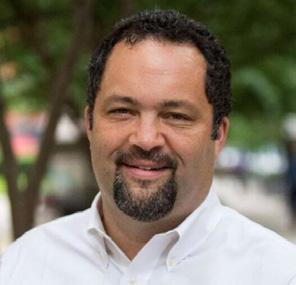
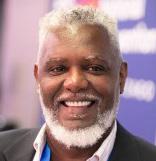

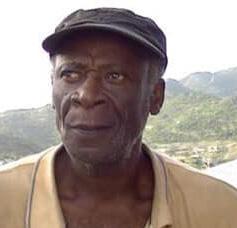
Rising Waters Will Not Drown the American Spirit by Ben Jealous - P 9
Talent Over Tokenism: Black Mayors Slash Crime Despite Media Silence by Stacy M. Brown - P 9
Royalton Resorts to Debut New Adults-Only Brand in Barbados - P 18
CWI Pays Tribute to Charles Henry ‘Jim’ Allen, Former Montserrat and Leeward Islands Cricketer - P 20

The African Export-Import Bank (Afreximbank) has announced its sponsorship of a groundbreaking artificial intelligence (AI) pilot initiative aimed at transforming Africa and the Caribbean into formidable players within the global technology arena.
The project, coordinated by the PJ Patterson Institute for Africa-Caribbean Advocacy, officially launched at The University of the West Indies (UWI), Mona campus, with plans to develop advanced AI ecosystems across both regions.
Dr. Gladstone Fluney Hutchinson, distinguished fellow and principal director of the African-Caribbean AI project at the Patterson Institute, is leading this transformative initiative in partnership with UWI collaborators and international stakeholders. The AI hubs are envisioned as strategic catalysts for industrial modernization, job creation, and equitable participation in the global digital economy.
Key project partners recently convened at the African Export-Import Bank’s annual meetings in Abuja, Nigeria, to advance the initiative. The high-level working group included Dr. Hutchinson; Dr. Nicholas Kerr, political scientist at the University of Florida; former Jamaican Prime Minister P.J. Patterson, who serves as statesman-in-residence at the institute; and Dr. Rosalea Hamilton, CEO of the Institute of Law and Economics at the University of Technology, Jamaica.
UN warns of worsening humanitarian crisis in Sudan as displacement, hunger and disease escalate
The situation is particularly dire in El Fasher, the capital of North Darfur province, which has witnessed some of the worst episodes of the ongoing conflict between rival militaries.
Those remaining in El Fasher are facing “extreme shortages” of food and clean water, with markets repeatedly disrupted, UN Spokesperson Stéphane Dujarric told journalists at the regular news briefing in New York.
Across the city, nearly 40 per cent of children under five are suffering from acute malnutrition, including 11 per cent with severe acute malnutrition.
Most of the surrounding water infrastructure has also been destroyed or rendered non-functional due to minimal maintenance and fuel shortages, Mr. Dujarric added.
Since April 2023, an estimated 780,000 people have been displaced from El Fasher town and the nearby Zamzam displacement camps, including nearly 500,000 in April and May of this year.
Famine conditions have been confirmed in the area since last August.
About three-quarters of Zamzam camp’s residents fled to various locations across Tawila, where the UN and its partners have scaled up critical humanitarian assistance.
‘Cooperation is humanity’s greatest innovation,’ UN chief declares at BRICS summit
Speaking at the 17th BRICS summit in Rio de Janeiro, Brazil, he emphasised the human impact of environmental devastation and climate change. And as environmental disasters increase, the sustainable development goals are also being left behind.
“Across the world, lives and livelihoods are being ripped apart, and sustainable development gains left in tatters as disasters accelerate,” Mr. Guterres said.
“The impact on human health is atrocious...the vulnerable and the poorer pay the highest price.”
BRICS was founded by Brazil, Russia, India and China in 2006. South Africa joined in 2011 and Egypt, Ethiopia, Indonesia, Iran, Saudi Arabia and the United Arab Emirates joined the group since. Collectively, these eleven States represent over half of the world’s population and approximately one-third of the world’s GDP.
On Sunday, Mr. Guterres addressed a session on strengthening multilateralism, economic-financial affairs and artificial intelligence, where he called for efforts to “minimize the risks and maximize the potential” of the breakthrough technology.
Chile and Argentina among coldest places on Earth as polar anticyclone grips region
On 30 June, both Chile and Argentina ranked among the coldest places on Earth, outside the polar regions. Governments in both countries issued early warnings and cold-weather alerts in response to the “polar-origin anticyclone” behind the extreme conditions, WMO said.
The cold snap in South America contrasts blistering heat in the northern hemisphere, especially in Europe, putting lives at risk and further underscores the worsening impacts of climate change.
In Mar del Plata, Argentina – about 380 kilometres (240 miles) south of Buenos Aires – where winters are “cool” and temperatures seldom drop below freezing, the unusual cold snap has affected natural gas distribution, primarily used for heating.
A UN staff member in the city reported that businesses were asked to remain closed to conserve gas supplies for homes. Schools and public buildings were also shut on Thursday and possibly Friday.
Across much of central and southern Argentina, temperatures were 10°C to 15°C – 50°F to 59°F – below seasonal averages. The cold spell began on 26 June and peaked on 30 June, bringing record lows to large parts of the continent. The high-pressure system brought atmospheric stability, resulting in clear skies and widespread severe frost.

Caribbean Community (CARICOM) Chair, Prime Minister Andrew Holness of Jamaica, has delivered a forceful appeal for renewed international support for Haiti, warning that the crisis-wracked nation cannot be abandoned to violent criminal gangs.
Speaking at the opening ceremony of the 49th Regular Meeting of the Conference of Heads of Government of CARICOM on Sunday at the Montego Bay Convention Centre in St. James, Holness stressed that CARICOM must intensify its efforts, even as international momentum appears to be slowing.
“We cannot be true to our principles in CARICOM if we do not redouble our
efforts in the international community to garner support for the mission in Haiti. We cannot leave our brothers and sisters in Haiti at the mercy of gangs,” Holness declared to resounding applause.
The Jamaican leader noted that Jamaica was one of the first countries to commit security support to Haiti. In September 2024, the Government of Jamaica deployed 20 members of the Jamaica Defence Force (JDF) and four from the Jamaica Constabulary Force (JCF) to assist in restoring order in Haiti, which has seen escalating gang violence and near-complete institutional breakdown. Kenya has also sent a security mission under a multinational framework.
Holness, who assumed the rotating chairmanship of CARICOM on July 1, 2025, for a six-month term, said the ongoing crisis in Haiti and the need to mobilize greater international support will remain a core priority under his leadership. He emphasized that regional security must be strengthened to disrupt the growing influence of criminal networks across the Caribbean.
He referenced a July 2024 United Nations Office on Drugs and Crime (UNODC) report titled “Drugs, Firearms, and Gang Networks in Jamaica, St. Lucia, Guyana, and Trinidad and Tobago,” which illustrates how gang influence, illicit weapons, and narcotics trafficking are destabilizing Caribbean societies. “We must dismantle the influence of gangs in our communities, disrupt their financing, and cut off access to weapons,” he said.
“I am on record as saying that we need to launch a war on gangs of a similar magnitude and nature to the war on terror,” Holness added, calling for the gang crisis to be addressed not only as a national security issue, but also as a public health emergency. He pointed out that 90 percent of both homicide perpetrators and victims are male, underscoring the social dimensions of the problem.
Holness promised that under his chairmanship, regional cooperation on security will be paramount, urging his CARICOM counterparts to prioritize unity in tackling the threats posed by transnational criminal networks.
Barbados Prime Minister Mia Mottley, the outgoing CARICOM Chair, also addressed the ceremony, expressing deep disappointment with the limited level of global assistance provided to Haiti thus far. She described Haiti’s instability as a persistent concern throughout her tenure.
“The world really needs a check on itself when it comes to Haiti,” Mottley said bluntly. “If ever we doubted that there were first-class and second-class citizens in the eyes of the world, don’t doubt it anymore.”
She noted that in 2023, more people were killed in Haiti than in any other country on earth, including those actively engaged in military conflicts. Despite this harrowing reality, she said the global community has failed to move beyond platitudes, leaving Haitians trapped in a cycle of violence and neglect.
Mottley emphasized that while CARICOM states have shown solidarity, their capacity is constrained by limited financial and logistical resources. She acknowledged Kenya’s leadership role in supporting Haiti’s security mission but stressed that much more is needed, particularly in terms of equipment and operational support.
The CARICOM summit continues this week in Montego Bay, with Haiti, regional security, climate financing, and economic cooperation high on the agenda.
The Caribbean Community (CARICOM) on Monday described the late veteran journalist, Rickey Singh, as “ a Caribbean son of the soil and journalist par excellence” as it joined in extending condolences to his family following his death.
The Guyanese-born Singh, who died in Barbados on July 5, will be buried on July 16 in Barbados, where he lived for several years.
In a statement, Caricom said that for more than five decades, Singh, “served as a pillar of journalism in the region” and that “his unwavering dedication to his craft, and his sharp analyses and fearless pursuit of truth, earned him respect and admiration across the region.
“Rickey, as he was popularly known, was a passionate advocate for our regional integration movement. His work facilitated a deeper under-
standing of the Caribbean Community. He had a profound understanding of the region’s political landscape and provided perspectives that were both insightful and instructive. This was invaluable to the people of the Community in the early days of our integration movement.”
Caricom said that “his was a strong and consistent voice in defense of press freedom, championing the vital role of independent journalism in strengthening our democracies.
”The Community mourns the loss of a committed regionalist and media titan. May his legacy continue to inspire future generations of Caribbean journalists,” it added.
Singh had received an honorary doctorate from the University of the West Indies (UWI) and a Lifetime Achievement Award from the Guyana government in 2023. (CMC)

The Canadian Imperial Bank of Commerce (CIBC) Caribbean’s Trinidad and Tobago operations fell victim to a sophisticated multimillion-dollar scam, police confirmed yesterday. According to authorities, the fraud was uncovered in June after the bank’s managing director reported unauthorized transfers totaling $14.8 million from a suspense processing account—a temporary holding fund used for unclassified or unclear transactions. Investigations revealed that the managing director had acted on what appeared to be legitimate authorization from the bank’s CEO, received via WhatsApp and email. However, after the transactions were completed, it was discovered that the CEO had no knowledge of the requests.
The funds were transferred to 19 different accounts in Hong Kong, Singapore, and Bulgaria. While some of the money was later recovered after several accounts were closed, approximately $9.4 million remains missing.
Police suspect the fraudsters used an advanced phishing scheme to impersonate the CEO and deceive the managing director into approving the transactions. Phishing, a common cybercrime tactic, involves tricking individuals into revealing sensitive information by posing as trusted entities.
Cybersecurity expert Travais Sookoo of Checkpoint Software Technologies explained that such scams have become increasingly prevalent in the Caribbean
since 2020, partly due to the rise of artificial intelligence (AI). “Previously, crafting a convincing phishing campaign required extensive research, but AI can now analyze a target’s online presence and generate tailored messages in minutes,” Sookoo said. He warned that AI not only accelerates the execution of scams like ransomware and phishing but also makes them more precise. “The key to phishing is getting the victim to lower their guard,” he noted, emphasizing that fraudsters often mimic legitimate institutions to lure victims into clicking malicious links. While AI has empowered cybercriminals, Sookoo pointed out that the same technology can be used to bolster cybersecurity defenses. Companies can deploy AI-driv-
en tools to detect and neutralize threats more efficiently. However, he stressed that employee training remains crucial. “Human error is often the weakest link,” Sookoo said. “Businesses should conduct regular phishing simulation exercises— random, unannounced tests—to keep staff vigilant.” He also recommended combining awareness programs with advanced security software to detect and respond to threats in real time.
As financial institutions face increasingly sophisticated scams, this incident serves as a stark reminder of the evolving dangers in the digital age—and the urgent need for stronger safeguards.

On June 25, the Commonwealth Short Story Prize announced its 2025 overall winner in a virtual ceremony, selecting Chanel Sutherland’s Descend—a gripping narrative set aboard a sinking slave ship—from among five regional finalists. The competition, which received a record-breaking 7,920 submissions this year, celebrates emerging literary talent across the Commonwealth. Sutherland, originally from St. Vincent and the Grenadines but now based in Montreal, triumphed over other regional winners, including Uganda’s Joshua Lubwama, Bangladesh’s Faria Basher, Guyana’s Subraj Singh, and Australia’s Kathleen Ridgwell.
Judges praised Descend as a “masterpiece” for its unflinching yet poetic exploration of enslaved Africans reclaiming their identities through shared stories as their ship founders. Chair judge Vilsoni Hereniko remarked that the winning entry “illuminates human nature with extraordinary skill,” while Commonwealth Foundation Director-General Anne T. Gallagher highlighted Sutherland’s ability to handle historical trauma with “precision and imagination.”
Though the Caribbean’s official regional contender, Subraj Singh’s Margot’s Run—a tale of a mother battling a supernatural threat—did not take the top prize, Sutherland’s victory still carried regional significance. Born in St. Vincent, she credits her upbringing for instilling a love of storytelling, particularly through her grandmother’s vivid oral traditions. “She could make you laugh and think deeply in the same tale,” Sutherland recalled. However, it was her teenage discovery of To Kill a Mockingbird after moving to Canada that ignited her passion for writing. “I realized stories could mirror my own experiences,” she said. “That’s when I began pouring out the tales I’d carried since childhood.”
Her winning story, Descend, emerged from years of research and reflection on the transatlantic slave trade. Sutherland emphasized her responsibility to approach the subject with humility: “I’m not just reconstructing history—I’m seeking emotional truths. These characters had their histories erased; storytelling becomes their resistance.”
Sutherland, who writes daily and draws inspiration from long walks in nature, urged aspiring authors to prioritize passion over trends.
“Write what moves you,” she advised. “If you don’t care, the process will feel hollow.” Her own creative method involves experimenting with structure and relentlessly revising until a story’s rhythm feels alive.
When notified of her win, her initial reaction was disbelief: “No way! I never imagined I’d write something worthy of this.” The accolade, she added, was a profound validation—especially for a story she describes as “about memory’s power to restore humanity amid violence.”
The Commonwealth Short Story Prize, a cultural initiative of the Commonwealth Foundation, has launched countless literary careers by amplifying underrepresented voices. This year’s submissions, as Hereniko noted, reflect how fiction intertwines with local histories while resonating universally. Presenter Malaika Uwamahoro underscored this during the ceremony, calling storytelling “the bedrock of all art” and a formidable craft to master. For Sutherland, the prize is both a milestone
and a stepping stone. Her debut short story collection, slated for publication in 2026, will further explore themes of identity and resilience. “Writers have a duty to spotlight what connects us,” she said. “Stories remind us—even in
darkness—of our shared humanity.”
As the literary world awaits her next work, Sutherland’s win reaffirms the enduring power of stories to confront the past, illuminate the present, and inspire the future.


A political firestorm has erupted in Guyana after revelations that a U.S. lobbying firm contracted by the government targeted presidential candidate Azruddin Mohamed, linking him to Venezuela’s Nicolás Maduro in a series of inflammatory tweets. The controversy has drawn sharp criticism from Mohamed’s camp and raised questions about the government’s use of foreign lobbyists in domestic politics.
Documents filed under the U.S. Foreign Agents Registration Act (FARA) reveal that Continental Strategy, a Virginia-based firm hired by Guyana’s government, drafted tweets for Florida Congressman Carlos Gimenez, accusing Mohamed of being a “pro-Maduro puppet” and a threat to democracy. One such tweet, posted by Gimenez on June 23, claimed Mohamed’s candidacy was part of Venezuela’s “attempt to encroach into Guyana.”
The lobbying contract, signed in December 2024, was ostensibly meant to promote trade, financial sector improvements, and Guyana’s international profile—not to engage in domestic political attacks. Yet the firm’s communications with Gimenez explicitly targeted Mohamed, whose party, We Invest in Nationhood (WIN), has emerged as a challenger to the ruling PPP/C.
When questioned by journalist Svetlana Marshall of News Source, President Irfaan Ali vehemently denied that the government had directed the lobbying firm to target Mohamed. “The government has hired no lobbying firm to target anyone,” he insisted, accusing the media of pushing a “political narrative.” However, when pressed on why Mohamed was mentioned in U.S. lobbying documents, Ali shifted focus, attacking Mohamed’s character.
“Azruddin Mohamed has been sanctioned
by the U.S. government for defrauding Guyana of $50 million,” Ali declared, referencing OFAC sanctions imposed in June 2024 over alleged gold smuggling and tax evasion. “This is no saint—he’s dangerous to our society.” The president emphasized that the sanctions were imposed by Washington, not Georgetown, and accused Mohamed of misleading the public by claiming otherwise.
Yet Ali offered no explanation for how Continental Strategy’s lobbying efforts against Mohamed aligned with the government’s stated objectives. Instead, he framed the issue as a matter of national security, citing Venezuela’s territorial threats.
“We have a serious danger with Venezuela,” he said. “Our diplomatic messaging must be intact.”
Mohamed has rejected the allegations, calling them a politically motivated smear.
“This is the PPP using a foreign nation to attack me,” he said in a statement, warning that the false claims endangered his safety. He accused the government of weaponizing U.S. sanctions to delegitimize his candidacy and vowed legal action.
“If they can do this to me, they can do it to anyone,” Mohamed said, urging Guyanese to reject what he called a “dangerous precedent.” His campaign has positioned the controversy as evidence of the government’s fear of electoral competition.
The incident has sparked concerns about the blurring of foreign policy and domestic politics. While the government maintains that its engagement with Continental
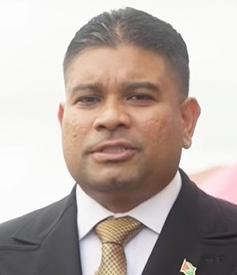
Strategy is focused on Guyana’s border dispute with Venezuela, the firm’s actions suggest a broader—and more contentious—agenda.
Congressman Gimenez, a hardliner on Venezuela, has not provided evidence for his claims about Mohamed’s ties to Maduro. Meanwhile, legal experts question whether the lobbying firm overstepped its mandate by meddling in Guyana’s elections.
As the September 1 election approaches, the scandal has intensified an already polarized political climate. With Mohamed threatening lawsuits and the government doubling down on its accusations, the fallout could extend far beyond campaign season—raising urgent questions about transparency, foreign influence, and the limits of political warfare.
In a strong parting message as her term as Chair of the Caribbean Community (CARICOM) came to an end, Prime Minister of Barbados Mia Mottley renewed her appeal for regional governments to fully adopt the Caribbean Court of Justice (CCJ) as their final appellate court.
Speaking at the opening ceremony of the 49th Regular Meeting of the Conference of Heads of Government of CARICOM, held on Sunday at the Montego Bay Convention Centre in St. James, Jamaica, Mottley urged leaders to embrace regional judicial sovereignty.
“Having been the one who chaired the preparatory committee for the establishment of the Caribbean Court of Justice, you will forgive me if I now make yet another appeal for the citizens of this region to allow their governments to know that there ought to be a singular purpose—for the Caribbean Court of Justice to be truly
the last Court of Appeal for the states,” said Mottley.
She acknowledged that some CARICOM member states are constitutionally required to hold referenda before making such a transition but emphasized that public education must be a priority.
“This, like everything else, ought to be the subject of public education. And if we can so do, then I believe we can finally start to move the needle generationally for us— recognising that this ought to be our final court,” she added.
Mottley’s remarks came just hours after Justice Winston Anderson was officially sworn in as the new President of the CCJ during a ceremony at the Jewel Grande Montego Bay Resort and Spa. In his inaugural address, Anderson expressed hope that more countries will join the CCJ in its appellate jurisdiction during his tenure. The CCJ, established in 2005, serves two
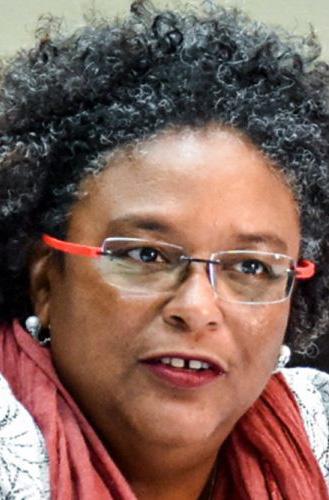
functions: it adjudicates disputes under the Revised Treaty of Chaguaramas governing the CARICOM Single Market and Economy (CSME), and it serves as the final appellate court for member states that have adopted it in place of the United Kingdom’s Privy Council.
While twelve countries were founding members of the CCJ, only five—Barbados, Belize, Dominica, Guyana, and Saint Lucia—have so far accepted it as their final appellate court. The remaining countries continue to rely on the Privy Council, based in London, for their highest level of legal appeals.
Mottley’s renewed appeal adds momentum to the long-standing debate over legal independence in the region, a matter viewed by many as a critical step in deepening Caribbean sovereignty and integration.

Jamaica’s Ambassador to Japan, ShornaKay Richards, has issued a powerful call for global nuclear disarmament, urging the international community and the passengers aboard the Peace Boat to “never give up the fight” for peace, justice, and a world free of nuclear weapons.
Speaking passionately during a lecture aboard the ship en route to Montego Bay,
Richards underscored Jamaica’s long-standing leadership in nuclear disarmament, tracing the island’s principled advocacy from its earliest post-independence years to its influential role in today’s global non-proliferation movement.
The lecture formed part of the Peace Boat’s ‘Time for Peace’ initiative, which marks the 80th anniversary of the end of World
War II and amplifies the testimonies of hibakusha, survivors of the atomic bombings of Hiroshima and Nagasaki.
“Even as a small island developing state, Jamaica has never been silent,” Richards declared. “Our history of slavery and colonialism has shaped our moral compass— we know what it means to fight for life, for dignity, for peace.”
In a personal reflection, Richards recalled how her path to disarmament advocacy was solidified in 2005 when she participated in a United Nations fellowship that took her to Hiroshima and Nagasaki.
“It was there that I found my voice,” she said, recounting the profound impact of meeting hibakusha and witnessing firsthand the devastation caused by nuclear weapons. “As I left Japan, I made a promise to the hibakusha that I would dedicate my life to the abolition of nuclear weapons.”
Richards has since become a prominent voice in the global disarmament arena, representing Jamaica at key diplomatic negotiations, including the working group that laid the foundation for the 2017 Treaty on the Prohibition of Nuclear Weapons (TPNW). She proudly noted that she was the only English-speaking Caribbean dele-
gate at those Geneva sessions, determined to ensure that small island states and women were meaningfully represented. She highlighted that Jamaica has ratified all major international treaties forming the backbone of nuclear non-proliferation, including the Treaty of Tlatelolco, the Non-Proliferation Treaty (NPT), the Comprehensive Nuclear-Test-Ban Treaty (CTBT), and the TPNW. Jamaica also made history as the first country in the world to impose a trade embargo against apartheid South Africa and has played a leading role in maintaining the Caribbean as a nuclear-free zone.
Despite these achievements, Richards warned that the world faces renewed dangers, citing escalating nuclear rhetoric, growing arsenals, and stalled multilateral disarmament efforts.
“The doomsday clock is at 89 seconds to midnight,” she cautioned. “Now is not the time to retreat. The hibakusha have never retreated.”
Richards closed her address with a stirring call to action, invoking the words of Bob Marley:
“Get up, stand up. Never give up the fight.”
Several activists and researchers in the reparations movement from across the region have hailed two successful days of constructive engagements with political representatives from the European Union (EU) and the United Kingdom (UK) on the issue of slavery reparations.
The delegation’s visit was organized by The Repair Campaign, a movement for reparatory justice in the Caribbean, guided by the Caribbean Community’s (Caricom) 10 Point Plan for Reparatory Justice. The delegation arrived in Europe earlier this week amid rising calls from Caribbean governments for the UK and other European nations to engage with formal demands for reparations for slavery and its enduring impacts across the region. However, the Chair of Caricom’s Reparations Commission (CRC), Sir Hilary Beckles has sought to distance the body from the group.
Beckles, who is also the Vice-Chancellor of The University of the West Indies (The UWI), said that there has been much media reporting referencing the group’s visit to Europe including “statements to the effect that these individuals, comprising
a few from the Caribbean but mostly Europeans, will engage in reparations conversations with political officials and civil society groups”.
Beckles said that as a consequence, the CRC has received several requests for interviews and comments, necessitating a statement to clarify the situation for the betterment of all concerned.
“These persons who have arrived in Europe are neither members of the CRC nor formally affiliated,” he said, adding that “for over a decade, the CRC has been actively promoting reparatory justice campaigns on a global basis and has adopted an open-tent policy approach to facilitate broad-based advocacy”.
The delegation included people from Barbados, Jamaica, Haiti, Suriname, St Kitts Nevis and St Lucia.
In a statement on Thursday, the group said meetings were held with met with representatives from across the European Union in Brussels, receiving support from representatives of Portugal, Italy, Spain, Denmark, France and Ireland. Their briefing event at the European Parliament was hosted by Irish MEP Seán Kelly.

The group then travelled to London to meet with UK politicians. Founded in 2022, the Repair Campaign aims to amplify Caribbean voices and foster meaningful dialogue on reparatory justice for countries impacted by the chattel slave trade. Repair Campaign says it engaged the Sir Arthur Lewis Institute of Social and Economic Studies (SALISES) at the University of the West Indies to develop 15 country-specific reparatory justice plans to address the enduring effects of chattel slavery, indentureship and colonialism.
“Our visit to Europe has been extremely positive, shining a light on the issue of reparations and allowing us to see the genuine passion that political representatives across the EU and UK have for our cause. Throughout the Caribbean, we see the aftermath of chattel slavery today in public health crises, inadequate education systems, underdeveloped infrastructure and high national debts,” said Don Marshall, director of SALISES and a member of the Caribbean delegation. (CMC)

More than a month has passed since NCB Financial Group (NCBFG) announced plans to raise US$300 million through a bond issuance, yet the market remains largely silent on its progress, raising questions about the status of the international capital markets offer. Initially unveiled on June 4, the bond—structured as senior unsecured notes—received
preliminary credit ratings of B+ from Fitch Ratings and B– from S&P Global Ratings.
NCBFG had stated that the issuance was contingent upon acceptable terms, particularly pricing, which was expected to take place on June 11. Pricing would have determined the interest rate and yield, but as of now, no updates have been provided.
In response to inquiries from the Sunday Business Guardian on Thursday, an NCBFG executive confirmed that the transaction is still being pursued.
“We are not able at this time to answer most specific queries about it as we seek to comply with all applicable requirements. We had initially indicated an expected date of pricing, but that was only an expectation. When pricing occurs, announcements will be made as usually expected and required,” the executive stated. There have been no updates from Fitch Ratings on the instrument, nor has a new NCBFG bond appeared on cbonds.com.
The proposed bond was intended to refinance US$269 million of debt maturing in 2025 and US$21 million of NCBFG’s 2026 obligations. According to roadshow documents, the
US$300 million bond would mature in 2030, based on the company’s pro forma debt amortisation profile.
NCBFG also launched a tender offer on June 5 for its US$64.96 million bond due in September 2025, which carries an 8.5% interest rate. The offer, which closed on June 10—just a day before the planned pricing—was structured as a debt swap, inviting investors to exchange the 2025 bond for the proposed new bond. However, the company has not provided any subsequent updates regarding the outcome of the tender.
Despite the apparent delay in the international issuance, NCBFG proceeded with a local bond offer, seeking to raise J$2.94 billion (US$18.36 million) to refinance existing debt. The local bond, launched on June 20, included two tranches:
Tranche A: J$1.18 billion at 9.5% interest for two years
Tranche B: J$1.77 billion at 9.75% interest for three years
The offer was scheduled to close on July 4. NCBFG’s move to the international capital markets is part of a broader strategy to rebal-
ance its debt portfolio. As of September 30, 2024, the group’s total debt stood at J$90.72 billion (US$571.64 million), of which J$45.99 billion (US$289.82 million) was denominated in U.S. dollars. Notably, J$62.99 billion (US$396.85 million) of this debt is listed as current liabilities for the 2025 fiscal year. The preliminary offering memorandum for the US$300 million bond indicated that NCBFG is exploring various asset sales and strategic initiatives aimed at improving liquidity and reducing debt. One major transaction was the January 24 sale of Thoma Exploitatie BV by Guardian Holdings Ltd (GHL) for J$20.5 billion (US$128.05 million), which resulted in a J$15.1 billion (US$97 million) after-tax gain, with J$9.4 billion (US$60 million) attributable to NCBFG shareholders.
However, not all planned divestments have materialised. The anticipated sale of a 30.2% stake in Clarien Group Ltd to Cornerstone Financial Holdings Ltd was terminated on May 8. Due to a pre-existing contractual provision, NCBFG is now obligated to acquire Portland Private Equity Ltd’s 17.92% stake in Clarien for approximately US$20 million.


This July, as the aquamarine waters shimmer with pride and Junkanoo rhythms fill the air, we at Carib News join hands with Bahamians at home and abroad in celebrating 52 years of independence—a milestone that is as triumphant as it is inspiring.
From the pink-sand shores of Harbour Island to the bustling heart of Nassau, The Bahamas stands as a symbol of resilience, heritage, and unshakable spirit. Independence is more than a date—it’s a declaration. And for over half a century, Bahamians have declared themselves a people of strength, pride, and purpose. Let’s be real—the journey hasn’t always been smooth sailing. As a nation of islands, The Bahamas faces unique challenges: economic vulnerabilities, the looming impacts of climate change, and pressing social concerns. But in the face of these storms, Bahamians have done what they do best—rise.
This year’s theme, “Together We Rise”, couldn’t be more fitting. It speaks to a collective willpower, a unity that bridges communities from Andros to Abaco, and stretches far beyond the archipelago to a vibrant and engaged diaspora in the United States. For over a century, Bahamians abroad have stood as cultural
ambassadors, economic partners, and policy advocates, ensuring the heartbeat of the islands echoes around the globe.
And let’s not overlook the homegrown magic—stimulating local economies, fostering innovation, and investing in sustainable development. The Bahamas is not just a postcard paradise; it’s a living, breathing, evolving nation committed to growth and transformation.
As we commemorate the rich history of independence, we also shine a light on the road ahead—a future where tradition and progress walk side by side. A future powered by education, economic empowerment, and a renewed focus on preserving the beauty and bounty of the islands for generations to come.
So, on this 52nd Independence Day, we applaud the Bahamian people—for their courage, their culture, and their unbreakable community spirit. Here’s to the dancers, the dreamers, the doers. Here’s to the past that made them, the present that sustains them, and the future they’re boldly building.
Happy Independence Day, Bahamas. Together, we rise.
As The Bahamas celebrates its fifty-second Anniversary of Independence on 10 July, Caribbean Community (CARICOM) Secretary-General, Dr Carla Barnett highlighted the diligence, solidarity, creativity, and innovation of the Bahamian people as key elements of the nation’s success. In her congratulatory message to Prime Minister Rt. Hon. Philip Davis, Secretary-General Barnett also recognised the country’s notable economic progress, which she says will undoubtedly accelerate its growth and development.
Commending The Bahamas’ commitment to sustainable development, she highlighted the nation’s efforts to protect its natural ecosystems. This commitment is exemplified by Prime Minister Davis’s historic signature on the United Nations (UN) Regional Agreement on Access to Information, Public Participation, and Justice in Environmental Matters in Latin America and the Caribbean (Escazú Agreement) on 5 June 2025, she stated.
Dr Barnett also noted its ratification of the Agreement under the United Nations Convention on the Law of the Sea on the Conservation and Sustainable Use of Marine Biological Diversity Beyond National Jurisdiction (BBNJ Agreement).
“This demonstrates your country’s commitment to sustainable ocean governance and its connectivity to tourism, for which you hold responsibility in the CARICOM Quasi-Cabinet,” the Secretary-General said.
The full message reads as follows:
Prime Minister,
On behalf of the Caribbean Community (CARICOM), I warmly congratulate the Government and People of the Commonwealth of The Bahamas on the country’s Fifty-Second Anniversary of Independence, which is being celebrated under the theme, “Together We Rise”.
This year’s theme emphasises the importance of national unity and shared
purpose, vital for advancing The Bahamas’ national development goals. The diligence, solidarity, creativity, and innovation of the Bahamian People have been key to the nation’s success.
This Anniversary aligns with a period of notable economic progress for The Bahamas, which will, undoubtedly, build even greater confidence in The Bahamian economy, fostering further economic growth and development.
I commend your Government’s efforts in protecting the country’s natural ecosystems and promoting sustainable development. In this regard, I acknowledge your historic signature, Prime Minister, of the United Nations (UN) Regional Agreement on Access to Information, Public Participation, and Justice in Environmental Matters in Latin America and the Caribbean (“Escazú Agreement”) on 5 June 2025.
Note is also taken of The Bahamas’ ratification of the Agreement under the United Nations Convention on the Law of the Sea
KARLISA RODNEY VICE PRESIDENT
on the Conservation and Sustainable Use of Marine Biological Diversity Beyond National Jurisdiction (BBNJ Agreement). This demonstrates your country’s commitment to sustainable ocean governance and its connectivity to Tourism, for which you hold responsibility in the CARICOM Quasi-Cabinet.
CARICOM remains grateful for your country’s tangible support for the Multinational Security Support (MSS) Mission in Haiti, and the Eminent Persons Group (EPG).
As the Community navigates the evolving global political dynamics, we anticipate The Bahamas’ continued contribution to deepening regional cooperation as together we rise as a Region.
I extend my best wishes to your Government and People for continued success, peace, and prosperity.
by Ben Jealous
On the Fourth of July, Donald Trump signed his “megabill.” The law boosts the dying fossil fuel industry with tens of billions of taxpayer dollars. It invites an additional 470 million metric tons of greenhouse gas emissions per year by 2035 – that’s the equivalent annual emissions of more than 100 million gas-powered cars. And it aims to stop dead in its tracks the clean energy transition and the green manufacturing jobs boom the Inflation Reduction Act was already starting to create.
Just hours later, a climate-fueled storm settled over and dumped four months worth of rain on Texas Hill Country. The Guadalupe River rose 26 feet within 45 minutes. The resulting flash floods killed at least 104 people – at the time of this writing, although that number will go up – mostly in Kerr County. That death toll includes dozens of young girls attending the Camp Mystic youth camp. This disaster was not a random event. It was a crisis written by the climate crisis and made far worse by the types of policies being pushed by this administration everyday.
Before the absurdly named One Big Beautiful Bill Act landed on Trump’s desk, his
administration had already begun gutting America’s frontline defenses against climate disasters – like the National Oceanic and Atmospheric Administration’s climate labs, the National Weather Service, and the Federal Emergency Management Agency.
As questions abound about why parts of the flood-impacted region did not receive adequate warning about the floods, Trump insisted that “nobody expected it” and it was a “once in 100 years” event. But storms like this, as well as increased flooding from the Guadalupe River, were expected – and predicted. The US Geological Survey – another vital body Trump is trying to eviscerate – issued a report to that effect in 2019. The science is clear: warmer air holds more moisture, intensifying storms and accelerating flood risk. We’re now witnessing the violent proof of these predictions.
According to UCLA climate scientist Daniel Swain, “this kind of record-shattering rain (caused by slow-moving torrential thunderstorms) event is *precisely* that which is increasing the fastest in [a] warming climate.”
As for the “one in 100 years” claim, those once-in-a-century extreme weather events are now happening far more often thanks
to the climate crisis! Between just 20152019, one St. Louis suburb had three major floods and at least two of them were considered “1-in-100-year events.”
It is not hard to see how the climate crisis became a political debate. Decades of anti-science propaganda from the coal, oil, and gas industries. Politicians bought and paid for by fossil fuel oligarchs. A current administration with a cabinet full of industry shills.
Big Oil alone spent a whopping $445 million through the 2024 election cycle to influence Trump and Congress. A staggering figure to be sure, that does not include donations funneled through dark money groups (likely tens of millions of dollars more – at least). And it still falls short of the $1 billion Donald Trump asked the country’s oil executives to kick in to his campaign -- an amount Trump insisted would be a “deal” for the industry because of what he was willing to give them.
But it is high time that our leaders, at every level and of every party, stop kowtowing to a toxic and unnecessary industry built on death, illness, and poisoning our communities. It is time they treat this crisis as a struggle for survival – a fight for the future our children deserve.
As the people of Texas grieve and the country grieves with them, their pain is our warning.
We are at a crossroads: We can double down on denial and let superstorms, heatwaves, droughts, floods, and fires determine our fate. Or we can lead – with science, resilience, courage, and a recommitment to our values.
If we harness our outrage and come together to fight like hell for our collective future, we will win. Because when people stand up and demand a safe planet, nothing – not even rising water – can drown the American spirit.
Ben Jealous is the Executive Director of the Sierra Club and a Professor of Practice at the University of Pennsylvania.
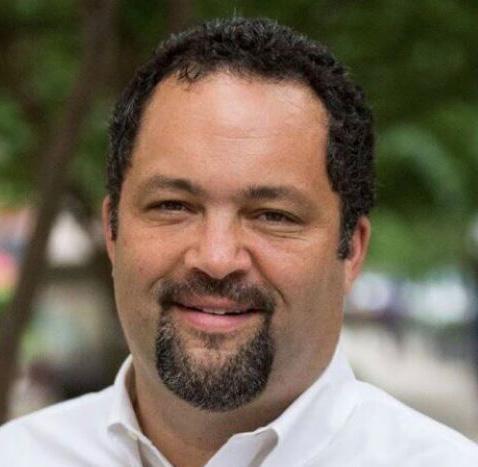
by Stacy M. Brown, Black Press USA Senior National Correspondent
While cable news pundits and national newspapers often fixate on urban dysfunction, Black mayors across America are delivering measurable, record-breaking progress in public safety—and getting almost no credit for it. Baltimore Mayor Brandon Scott and Birmingham Mayor Randall Woodfin have overseen some of the steepest reductions in violent crime their cities have experienced in decades. But they are far from alone. From New York to Los Angeles to Chicago, Black mayors are proving that talent, vision, and a relentless focus on evidence-based policy—not tokenism—are transforming communities. Yet their achievements have largely been ignored by mainstream media outlets that rarely look past sensational headlines.
Baltimore, long branded one of America’s most dangerous cities, released midyear crime data showing a 22% drop in homicides compared to the same period last year. Nonfatal shootings are down 19%, and juvenile homicide victims have declined by an astonishing 71%. Police are solving more crimes, with a homicide clearance rate of 64% and a nonfatal shooting clearance rate 20 percentage points above the department’s 10-year average. “These historic lows are the result of a comprehensive, evidence-based public safety strategy that we have implemented in partnership with residents,” Mayor Scott said. “But our work is far from over—68 lives lost to violence is 68 too many.” The progress didn’t happen by chance. Under
Scott’s leadership, the Baltimore Police Department has combined targeted enforcement with offers of help. Commissioner Richard Worley described how the Group Violence Reduction Strategy works: “We go out and give them a letter and basically say, ‘Listen, we know you were doing the shooting. We want you to put the guns down, or we will take you and your entire drug operation off the street. But here are the services—job training, education, relocation.’” Meanwhile, in Birmingham, Mayor Woodfin has led an aggressive, community-driven approach that’s paid off. The city’s homicide rate has fallen 52% compared to last year, and the clearance rate for homicides has surged to 79%, a level rarely seen in major cities. “The Birmingham Police Department is extremely aggressive in what they’re doing and how they’re taking a different approach in policing our community,” Woodfin said. He credited a blend of new technology, such as the Real Time Crime Center, and grassroots cooperation. “When you share information, it doesn’t allow the criminal element to be emboldened and hide behind fear of people,” Woodfin explained. “Those who are killing people are not just walking our streets.” Birmingham Police Chief Michael Pickett said the city’s street outreach teams are also preventing retaliatory shootings before they happen. “We are really, really hammering at it,” Pickett told the City Council. “I am very appreciative of all the men and women in the Birmingham Police
Department who are leading our fight.”
While total violent crime in Birmingham has edged up slightly, the plunge in homicides shows that sustained focus and coordination can work—even if major media don’t bother to cover it. State and federal partners in Maryland have also acknowledged Baltimore’s progress. “Baltimore City released a midyear report showing the fewest homicides ever recorded at this point in a single year,” Maryland Governor Wes Moore’s office said in a statement. Across the country, other Black mayors are driving similar results.
In New York City, Mayor Eric Adams has presided over a 24% drop in shootings and a 14% decline in murders so far in 2025, the fewest shooting incidents recorded in more than a decade. Robberies and burglaries are also down, with NYPD data showing consistent reductions across nearly every major crime category. On the West Coast, Los Angeles Mayor Karen Bass saw homicides fall 14% in 2024 and gang-related killings drop nearly 45% in areas targeted by community safety programs. Overall violent crime declined by 3%, and property crimes like burglary and auto theft dropped by thousands of incidents compared to the prior year.
In Chicago, Mayor Brandon Johnson has overseen a 22% decrease in murders and a 31% drop in shootings through early 2025, reaching the city’s lowest homicide totals in over a decade. Officials credit community-based outreach and investments in neighborhood
violence prevention. And in Atlanta, Mayor Andre Dickens announced that violent crime was down nearly 16% in 2024, with homicides decreasing and property crime dropping as well. The city has invested in hiring more officers while expanding the At-Promise Centers that connect youth with educational and mental health resources.
In both large and mid-sized cities, the results are undeniable: fewer families burying loved ones, more cases solved, and more residents willing to engage with police. But to hear much of the national narrative, you’d never know it. As several social media users have pointed out, in Baltimore, Birmingham, New York, Los Angeles, Chicago, and Atlanta, Black leadership is not a box to check or a headline to boast about. It’s what drives real, life-saving change—whether the national media notices or not. “While we acknowledge the historic lows we are experiencing, we must simultaneously acknowledge that there is much more work to do,” Scott stated. “And our success makes me commit even further to doing it.”

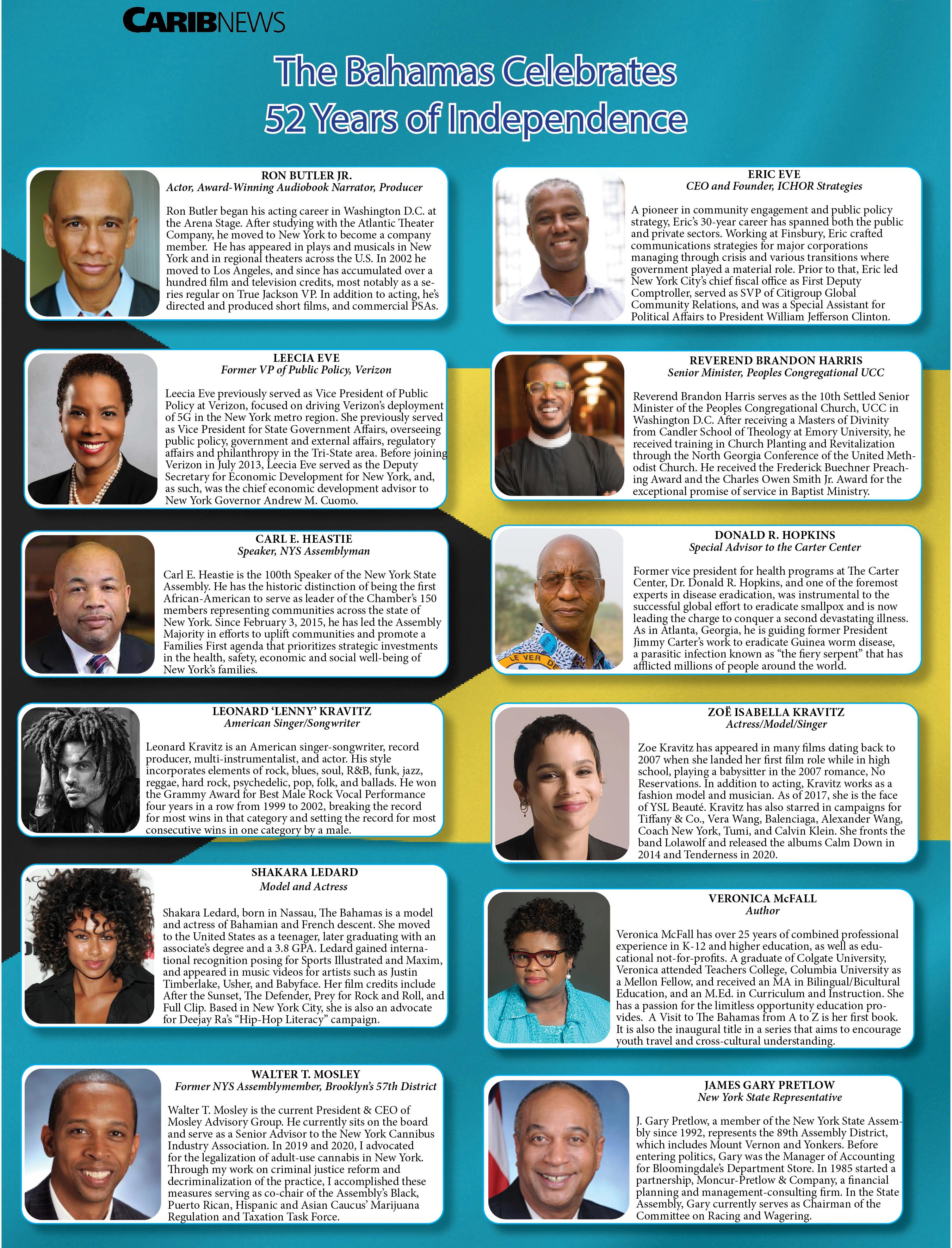



As we celebrate the Bahamas’ 52nd Independence Anniversary under the theme ”Together: We Rise,” we are reminded of the powerful call to unity and love. It reminds us that our greatest strength lies in our togetherness—that as one
people, we can achieve far more than we ever could alone. Let this theme ignite a renewed sense of hope within us all, inspiring us to dream bigger, work harder, and uplift each other.
Now is the time to join hands and move
forward as one nation, bound by the unbreakable ties of community and shared purpose. From the tranquil shores of Inagua in the south to the vibrant communities of Grand Bahama in the north, our connections define us and propel us forward.
Let us celebrate our unity, embrace our diversity, and rise together. For it is only together that we can build the future we envision. Together, we rise!

As the Commonwealth of the Bahamas prepares to celebrate 52 years of independence on July 10, 2025, mother and daughter duo Dr. Mary J. Sweeting and Judge J. Machelle Sweeting are weaving the vibrant tapestry of Bahamian heritage and civic duty into the heart of New York’s Bahamian American community.
Dr. Mary J. Sweeting, a lifelong Harlem resident, serves as President of the Bahamian American Association, Inc. (BAAI), an organization founded in 1912 to preserve and promote Bahamian culture in New York. As the first woman to serve as BAAI Board chair, Dr. Sweeting is described as “a cultural lighthouse,” illuminating Bahamian customs, music, and cuisine for the Harlem diaspora. Under her leadership, the Association has hosted Women’s History Month forums, Independence Day programs, scholarship initiatives and cultural workshops - fortifying the deeply rooted bond between New York and The Bahamas.
Mary Sweeting’s daughter, Judge J. Machelle Sweeting, has forged her own legacy on the bench. Elected to the New York City Civil Court in 2014 and re-elected again in 2024, Judge Sweeting has presided over the most complex cases involving child custody, visitation and domestic violence in the New York County Family Court. As an Acting Justice of the New York State Supreme Court, she current-
ly presides over guardianship cases, which are emotionally charged proceedings that profoundly affect the lives of individuals and their families. She also served as the Presiding Jurist in the problem-solving Harlem Community Justice Center and managed the multi-faceted docket and high volume litigation of the City Part.
Together, Dr. Mary J. Sweeting and daughter Machelle channel their roles to uplift the Bahamian community throughout the United States, and especially in Harlem, New York. While Dr. Sweeting curates cultural access through community outreach and programming, Judge Sweeting ensures equitable access to the court system through the use of technology and remote-appearances and other court services that help demystify the court process.
This July 10, as Bahamians globally mark over half a century of independence, the mother-daughter pair will attend an annual church service in celebration of their ancestry, where they will join with fellow Bahamians to reflect on their shared ideals to forge a brighter future filled with opportunity for Bahamians both here in New York and in the Bahamas.


Downstate recently hosted a powerful Caribbean Heritage Month celebration where culture met community action. From the sound of the dominoes slamming on the tabletop to the lightning-round questions about curry chicken versus chicken curry or sorrel versus ginger beer, Downstate’s Caribbean Heritage Month celebration was a vibrant tapestry of taste, laughter, and purpose.
In a fun conversation, we welcomed Gregg Bishop, a Grenadian son of Flatbush and Executive Director of the Joe and Clara Tsai Foundation Social Justice Fund, who grounded the moment in shared roots and a powerful call to community action.
The event was a living expression of Brooklyn’s Caribbean diaspora, Downstate’s ties to the diaspora, its space in the conversation, and its enduring role in honoring cultural identity, advancing health equity, and leading with inclusion.
More than curry chicken, sorrel, ginger beer, and island claims to cocoa tea su-
premacy, the conversation also focused on meaningful reflections of cultural identity, health equity, public trust, colonial legacies, mentorship, and the responsibility of institutions like Downstate to lead with inclusion.
Bishop took the audience on a deeply personal journey, tracing his path from his mother’s decades of service as a Downstate nurse to his leadership in philanthropy and policy, and served as a wonderful homecoming to a place where he grew up, knowing so many individuals, some of whom came out to welcome him.
We celebrated the richness of Caribbean heritage, reaffirmed a cultural identity grounded in action and tradition, and reminded ourselves why we #KeepCareClose in a diverse community.
Whether from Barbados, Grenada, Guyana, Haiti, Jamaica, Trinidad, or another Caribbean nation, this gathering honored the power of showing up fully and reminded us that “when one of us eats, we all eat.”

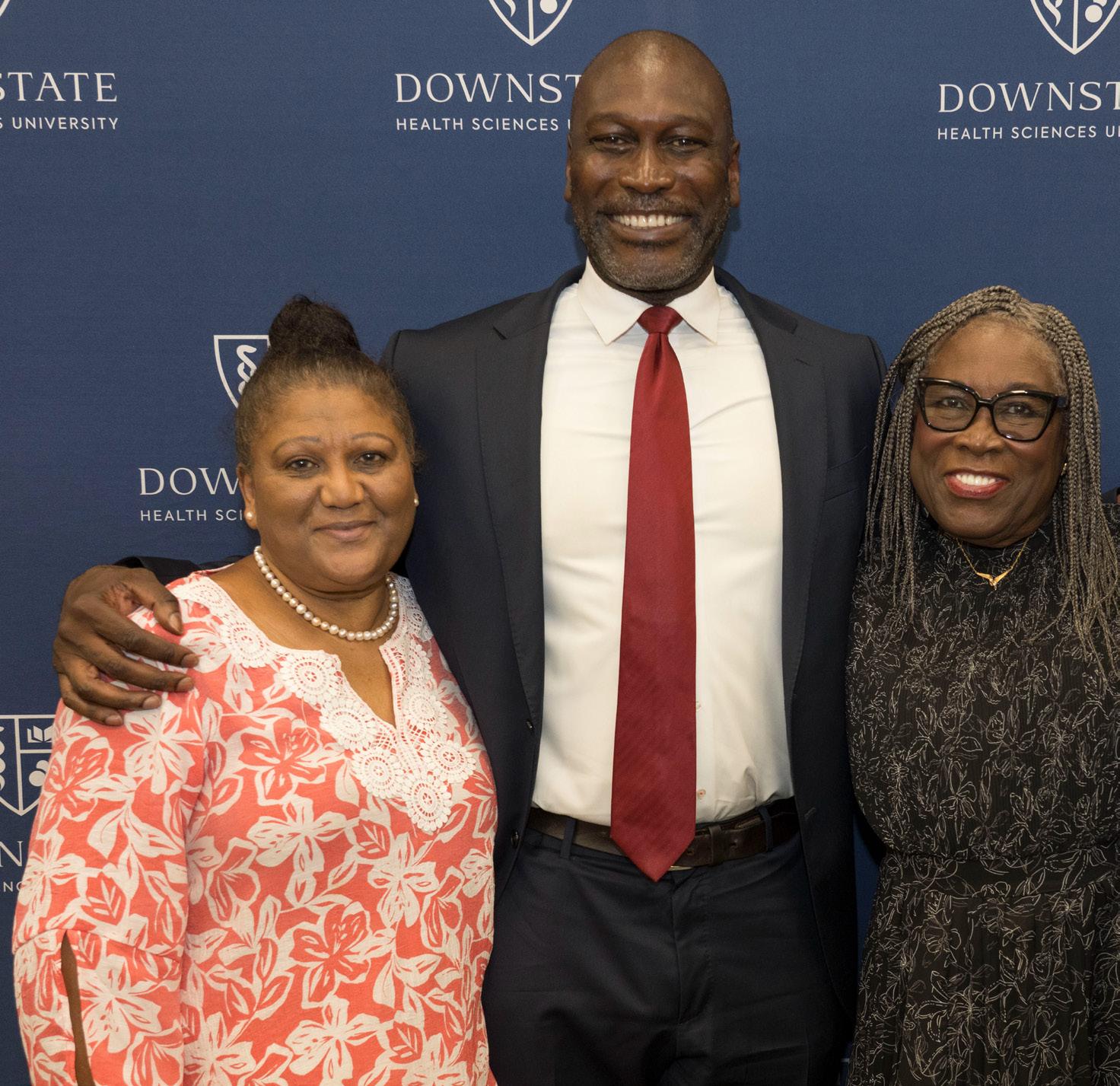

The Airport Authority of Trinidad and Tobago (ATT) says an international passenger arriving at Piarco International Airport on Tuesday morning has died after suffering a medical emergency in the immigration hall.
The ATT did not name the passenger, but extended its “deepest condolences to the family and loved ones of the passenger during this difficult time.”
It said that the incident occurred at “around 6:00 am (local time) when the arriving international passenger became unresponsive shortly after entering the
immigration hall.
Emergency Medical Technicians (EMTs) stationed at the airport responded immediately and provided urgent care.”
ATT said the passenger was then taken to the Arima Health Facility, but that it later “received confirmation that the passenger had died.
“Airports Authority of Trinidad and Tobago wishes to extend deepest condolences to the family and loved ones of the passenger during this difficult time,” it added without indicating from which country, or aircraft, the passenger had arrived from.
The tragic murder of 40-year-old Jamaican woman Tamara Rowe in her Bronx apartment on Saturday night has left her two young children in limbo as authorities work to determine their future care.
Rowe’s children, aged 11 and two, are currently in the custody of the New York City Administration for Children’s Services (ACS). Family members and close friends are now seeking to have the children released from state care and placed in a familiar, supportive environment.
A court hearing on the children’s welfare was reportedly held on Monday, but details remain sealed due to the minors’ age.
The Jamaican Consulate in New York has confirmed its involvement in the case.
“In accordance with our duty of care to Jamaican nationals abroad, we are making inquiries regarding the welfare of the children affected by this devastating event,” Consul General Alsion Wilson said in a statement.
A man wrongfully convicted of a deadly shooting in Brooklyn more than 20 years ago and later deported to Guyana is now working to return to the United States after his name was officially cleared. Brian Kendall, now 54, was just 17 years old when he was accused of killing
Raphael Reyes in a Flatbush candy store with a video game room in 1988. Facing the possibility of a life sentence, Kendall pleaded guilty to manslaughter the following year—a decision his attorney says was made without understanding that the evidence against him was weak.
Kendall served over 16 years in prison and was deported to Guyana in 2005. On Tuesday, a Brooklyn Supreme Court judge vacated his conviction, following a joint investigation by the Legal Aid Society and the Brooklyn District Attorney’s Conviction Review Unit (CRU).
District Attorney Eric Gonzalez’s office determined that Kendall was actually acting as a Good Samaritan, running with others who were chasing the real gunman after the shooting. The CRU’s report concluded that Kendall is “likely innocent,” and noted that his guilty plea does not change...

The World Health Organization (WHO) today has launched a major new initiative urging countries to raise real prices on tobacco, alcohol, and sugary drinks by at least 50% by 2035 through health taxes in a move designed to curb chronic diseases and generate critical public revenue. The “3 by 35” Initiative comes at a time when health systems are under enormous strain from rising noncommunicable diseases (NCDs), shrinking development aid and growing public debt.
The consumption of tobacco, alcohol, and sugary drinks are fueling the NCD epidemic. NCDs, including heart disease, cancer, and diabetes, account for over 75% of all deaths worldwide. A recent report shows that a onetime 50% price increase on these products could prevent 50 million premature deaths over the next 50 years.
“Health taxes are one of the most efficient tools we have,” said Dr Jeremy Farrar, Assistant Director-General, Health Promotion and Disease Prevention and Control, WHO.
“They cut the consumption of harmful products and create revenue governments can reinvest in health care, education, and social protection. It’s time to act.”
The Initiative has an ambitious but achievable goal of raising US$1 trillion over the next 10 years. Between 2012 and 2022, nearly 140 countries raised tobacco taxes, which resulted in an increase of real prices by over 50% on average, showing that large-scale change is possible.
From Colombia to South Africa, governments that have introduced health taxes have seen reduced consumption and increased revenue. Yet many countries continue to provide tax incentives to unhealthy industries, including tobacco. Moreover, long-term investment agreements with industry that restrict tobacco tax increases can further undermine national health goals. WHO encourages governments to review and avoid such exemptions to support effective tobacco control and protect public health.
Strong collaboration is at the heart of the “3 by 35” Initiative’s success. Led by WHO, the Initiative brings together a powerful group of global partners to help countries put health taxes into action. These organizations offer a mix of technical know-how, policy advice, and real-world experience. By working together, they aim to raise awareness about the benefits of health taxes and support efforts at the national level.
Many countries have expressed interest in transitioning toward more self-reliant, domestically funded health systems and are turning to WHO for guidance.
The “3 by 35” Initiative introduces key action areas to help countries, pairing proven health policies with best practices on implementation. These include direct support for country-led reforms with the following goals in mind: Cutting harmful consumption by reducing affordability;
Increase or introduce excise taxes on tobacco, alcohol, and sugary drinks to raise prices and
reduce consumption, cutting future health costs and preventable deaths.
Raising revenue to fund health and development;
Mobilize domestic public resources to fund essential health and development programmes, including universal health coverage.
Building broad political support across ministries, civil society, and academia; Strengthen multisectoral alliances by engaging ministries of finance and health, parliamentarians, civil society, and researchers to design and implement effective policies. WHO is calling on countries, civil society, and development partners to support the “3 by 35” Initiative and commit to smarter, fairer taxation that protects health and accelerates progress toward the Sustainable Development Goals.

Loneliness is linked to approximately 100 deaths every hour – more than 871,000 deaths annually. By contrast, strong social connections are associated with better health and longer life, the UN health agency said on Monday.
WHO defines social connection as the ways in which people relate to and interact with one another. Loneliness is the distressing feeling that arises when there is a gap between desired and actual social relationships, while social isolation refers to the objective lack of social ties.
“In this age when the possibilities to connect are endless, more and more people are finding themselves isolated and lonely,” said Tedros Adhanom Ghebreyesus, WHO Director-General.
Disproportionate impact
While loneliness affects people across all ages, young people and people living in low- and middle-income countries are especially vulnerable.
“Even in a digitally connected world, many young people feel alone. As technology reshapes our lives, we must ensure it
strengthens – not weakens – human connection,” said Chido Mpemba, co-chair of WHO Commission on Social Connection, which published the report.
The report, From loneliness to social connection: charting the path to healthier societies, highlights concerns about excessive screen time and harmful online interactions, particularly among youth and their negative effects on mental health.
Multiple factors contribute to loneliness and social isolation, including poor health, low income and education, living alone, lack of adequate community infrastructure and public policies, as well as certain aspects of digital technologies.
Loneliness and social isolation increase the risk of stroke, heart disease, diabetes, cognitive decline, and early death. Lonely people are twice as likely to experience depression and may also face heightened anxiety and suicidal thoughts.
Conversely, social connection offers protective benefits throughout life—reducing inflammation, lowering the risk of serious illness, promoting mental health, and extending longevity.
The report lays out a roadmap for global action focused on five key areas: policy, research, interventions, improved measurement and public engagement. Together, these aim to reshape social norms and build a movement for social connection. While the costs of social isolation and loneliness are steep, the benefits of social connections are profound. WHO urged governments, communities, and individuals to make social connection a public health priority.


Clarendon-born fashion designer Mikayla Salmon has turned a lifelong dream into a remarkable reality, securing a coveted collaboration with global fast-fashion powerhouse Shein—a breakthrough that has propelled her from a small-town creative to an international designer.
What began as a passion nurtured in high school took an extraordinary leap last November when Shein unexpectedly contacted Salmon to partner on a collection. Initially, she was skeptical.
“At first, I thought it was a scam,” she laughed. “I said to myself, ‘Shein just texted my phone? That can’t be real.’ I left the message on read for about two hours until I literally heard a voice say, ‘Respond to the message.’”
When she finally replied, Shein promptly sent over a contract. The result: her debut fourpiece spring collection, launched in April 2025, featuring modern, trend-forward designs and a runaway best-seller.
Salmon’s Shein collection blends her bold creative vision with contemporary fashion sensibilities. It features:
A playful pink romper
A denim bubble mini dress
A sunset ombré cut-out bodycon dress
A standout two-piece orange skirt set
The two-piece quickly became her best-selling item, selling out twice, with Shein preparing to re-release the design in a new, top-secret color.
To Salmon’s knowledge, she is the second Jamaica-born designer to collaborate with Shein on this scale—an achievement that fills her with pride. The company gave her five months
to design the collection, during which she submitted 14 designs, of which four were selected. “Shein handled everything else—the cutting, sewing, branding, marketing, and fulfillment,” she explained. “My only responsibility was to create and send the original sketches.” Salmon’s journey is rooted in resilience and ambition. The 29-year-old part-time pharmacy technician first made waves when she won the Campari Pop Style competition in 2018, and last year, she showcased her designs in Cuba. Despite her growing international profile, she still sews for clients attending local events like Chillin’ on the Farm and Teacup Sundays and customizes bridal wear, swimwear, and pageant gowns.
The designer launched her brand, Young Addiction, with a mission to create clothing for all body types—especially plus-size women.
“It’s always been important for me to make people feel beautiful, especially women like me who struggle to find stylish clothes that actually fit,” Salmon said.
Her creative energy is heavily influenced by
Jamaica’s golden era of the 1990s, when bold colors, daring silhouettes, and fearless self-expression dominated local fashion.
“A lot of people had their own unique style then, and the world was looking to Jamaica for fashion cues,” she reflected.
Despite her obvious talent, Salmon admitted that self-doubt was her biggest hurdle.
“I second-guessed myself a lot,” she said. “I kept wondering, will people like my designs? Will Jamaicans support me? I wanted to showcase something bold but wasn’t sure how it would be received.”
Her persistence ultimately paid off. Salmon had previously entered two Shein competitions and applied three times to the Shein X designer program without success. She believes her repeated applications kept her on the company’s radar and eventually led to her selection.
Although the Shein collaboration was met with excitement on TikTok and other social media platforms, Salmon noted that many Jamaicans still don’t realize she’s the designer behind the collection.

On June 20, celebrated trumpeter and composer Etienne Charles unveiled Gullah Roots, his latest album delving into the rich cultural tapestry of the Gullah people—an African American ethnic group rooted in the coastal Lowcountry of the southeastern United States. Though Charles is best known for his deep engagement with Caribbean musical traditions—particularly those of his native Trinidad and Tobago—Gullah Roots reveals striking connections between the Gullah culture and the wider African diaspora.
“Jazz is Caribbean music,” Charles asserts, pointing to New Orleans as a historical crossroads where African, Caribbean, and American influences converged to shape the genre.
“When I began this project, I sensed there was a link between the Lowcountry and the Caribbean. As I explored further, those ties became undeniable.”
The album’s standout tracks illustrate these cultural intersections with vivid artistry. “Gullypso” blends the rhythmic pulse of Trinidadian calypso with the earthy swing of Gullah folk music, while the two-part “Watch Night” transforms a traditional Gullah prayer ritual into a dynamic jazz suite—moving from haunting choral harmonies in “Prayer” to the ecstatic, percussion-driven “Ring Shout.” Charles also reimagines “Kumbaya,” a hymn with Gullah origins, as a transcendent closing meditation, featuring Kilgore’s soul-stirring choir.
Yet Gullah Roots stretches beyond the Americas, reaching back to Africa itself. “Bilali” incorporates the guembri (a North African bass lute) and krakeb (Moroccan castanets), while “Igbo Landing” memorializes the 1803 mass resistance of enslaved Igbo people in Georgia, its somber melodies and turbulent rhythms evoking both tragedy and resilience. “The diaspora is one,” Charles reflects. “This music is about honoring those connections.”
Born in Trinidad in 1983, Charles grew up immersed in music. His father, Francis, a steelpan virtuoso and avid record collector, filled their home with sounds ranging from calypso to jazz. By his teens, Charles was performing with Phase II Pan Groove, one of Trinidad’s premier steel bands, but his passion for jazz led him to Florida State University in 2002. There, under the mentorship of pianist Marcus Roberts, he honed a style that seamlessly wove Caribbean vernacular into jazz’s improvisational language. After winning top honors at the International Trumpet Guild and National Trumpet competitions, Charles earned a scholarship to Juilliard, where he refined his vision. Since then, he has collaborated with icons like Wynton Marsalis and Maria Schneider while carving out a singular niche as a bandleader. Gullah Roots, his eleventh album, builds on two decades of cross-cultural exploration—from 2006’s Culture Shock to 2019’s Carnival: The Sound of a People.
For Charles, Gullah Roots is more than an album; it’s an act of reclamation. “These stories—of survival, faith, and cultural preservation—are part of a global narrative,” he says. Whether channeling the spiritual intensity of a Gullah ring shout or the mournful defiance of Igbo Landing, his music bridges past and present, offering listeners a chance to “re-examine history through sound.”
With its lush arrangements and profound historical resonance, Gullah Roots reaffirms Charles as one of jazz’s most compelling sonic archaeologists—a musician who, no matter the terrain, always finds his way home. Released on his independent label, Culture Shock Music,
the project features a stellar sextet, including alto saxophonist Godwin Louis, pianist Christian Sands, guitarist Alex Wintz, bassist Russell
and drummer
percussionist Quentin E. Baxter and vocalist Mykal Kilgore.

A federal judge in New York has blocked the Trump administration’s effort to strip immigration protections from thousands of Haitians living in the United States, ensuring their continued legal status—at least for now.
U.S. District Judge Brian Cogan ruled on Friday that the Department of Homeland Security’s attempt to terminate Temporary Protected Status (TPS) for Haitians was unlawful. The ruling preserves the Biden administration’s 2024 extension of TPS, which allows up to 500,000 Haitians to remain and work in the United States until February 3, 2026.
The court decision comes just days after Homeland Security Secretary Kristi Noem announced plans to end the TPS designation for Haiti by September 2, 2025. Judge Cogan found that such an early termination violated the rules established under the TPS statute, which requires proper notice and prohibits ending protections before a previous extension expires.
Cogan emphasized that many Haitians under TPS have built their lives in the United States with the understanding that their status would remain valid until 2026.
“When the Government confers a benefit over a fixed

period of time, a beneficiary can reasonably expect to receive that benefit at least until the end of that fixed period,” he wrote in his 23-page decision.
The judge made clear that Secretary Noem cannot enforce the early termination.
TPS is granted to nationals from countries facing armed conflict, natural disasters, or extreme instability. Secretary
Noem claimed that conditions in Haiti had improved enough to allow citizens to return safely. However, the U.S. State Department continues to advise Americans against traveling to Haiti, citing serious risks of kidnapping, violent crime, civil unrest, and limited healthcare services.
The attempt to end TPS for Haitians is part of a broader Trump-era effort to roll back protections for immigrants from multiple countries, including Cuba, Nicaragua, Venezuela, Cameroon, and Afghanistan. Although the Biden administration had extended TPS for several groups, the issue remains highly contested in U.S. courts. Just last month, the U.S. Supreme Court allowed the administration to revoke TPS protections for roughly 350,000 Venezuelans.
In contrast, Judge Cogan’s ruling affirms that the Haitian community will retain its TPS protections until the scheduled expiration date unless further legal action overturns the decision. For now, Haitian TPS holders can continue to live, work, and contribute to American society without fear of immediate deportation.
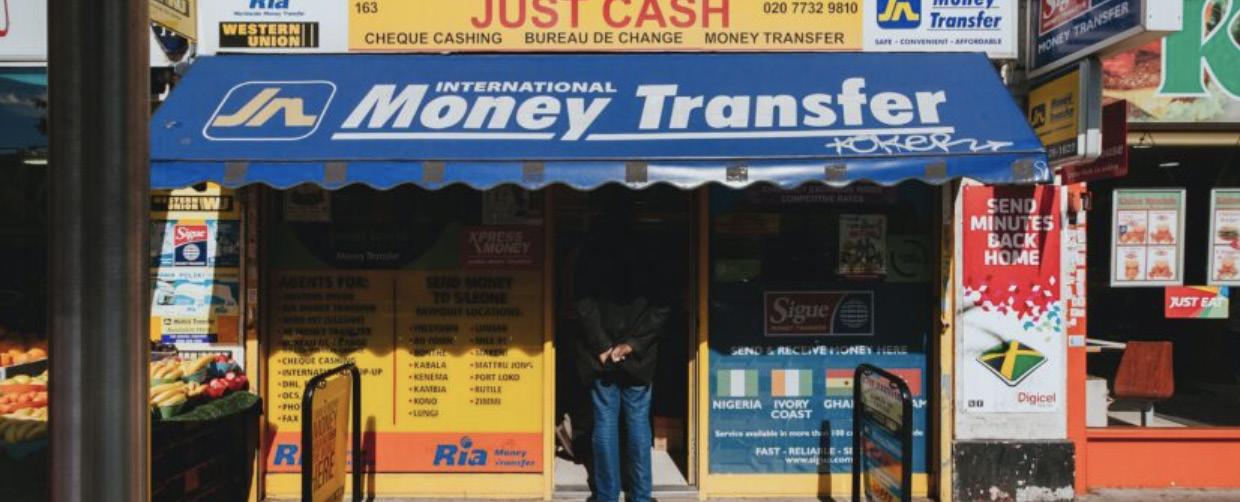
Starting December 31, Jamaicans living in the United States who send money to family members back home will face a new financial burden—a one percent excise tax on each remittance transaction.
The measure, introduced under the One Big Beautiful Bill Act recently passed by the U.S. Congress, is expected to be signed into law by President Donald Trump. Although the tax rate was initially proposed at five per cent, it was eventually reduced to one percent during Senate negotiations. By increasing the cost of sending money, the tax is expected to directly affect the flow of remittances, a lifeline for thousands of Jamaican families. Analysts suggest that the higher transaction cost may discourage some migrants from sending money as frequently or in the amounts they once did, potentially reducing the financial stability of recipient households in Jamaica.
For the Jamaican economy, the implications are significant. The tax represents a systematic transfer of resources to the
U.S. Treasury, which is projected to collect approximately US$10 billion from similar transactions worldwide. If Jamaica receives US$2 billion in remittances within a year, the one per cent levy would result in a US$20 million outflow to the United States. Currently, Jamaica benefits from annual remittance inflows estimated between US$3.3 and US$3.5 billion—funds that account for nearly 17 to 20 percent of the country’s gross domestic product (GDP).
The Bank of Jamaica has already flagged U.S. policy shifts on remittances as a potential threat to the island’s economic outlook. According to a government-commissioned analysis reviewed by reporters, any reduction in remittance inflows could directly limit household consumption, weaken education and healthcare investments, and stifle support for micro and small businesses. While the tax will apply to cash-based transfers, money orders, cashier’s checks, and similar instruments, it notably ex-
empts bank wires, debit and credit card payments, and most digital remittance services. The tax will also primarily affect green card holders, permanent residents, and visa holders. U.S. citizens sending funds to Jamaica will not be subject to the new fee.
Communities in U.S. states with significant Jamaican populations—such as New York and Florida—will likely feel the greatest impact. Financial experts warn that senders who rely on cash transactions, especially older migrants or those without access to banking services, may struggle to avoid the new tax. Others are expected to explore digital platforms or direct bank transfers to circumvent the added cost. However, there is growing concern that the tax could push some migrants toward informal, unregulated channels to evade the fee, potentially increasing the risk of illicit transactions and weakening oversight in the formal remittance sector.
“A one percent tax effectively reduces the disposable income of remittance-receiving households. It functions much like a new import duty on foreign aid from the diaspora,” the analysis cautioned. “Over time, this could dampen consumer spending, limit poverty reduction efforts, and pressure small businesses that rely heavily on remittance-driven purchases.”
The study further warned that while the tax rate has been reduced from the initial five percent, even a modest fee could threaten financial inclusion in the Caribbean by encouraging transactions outside
the formal banking system.
The legislation includes anti-avoidance provisions, referencing the application of anti-conduit financing rules to remittance flows. This is expected to increase regulatory oversight of money transfer operators and may require the use of stricter reporting and compliance systems. Such measures, while aimed at preventing tax evasion and money laundering, may also raise the cost of doing business for remittance service providers and slow transaction processing times.
Remittance companies that primarily serve the Caribbean market will likely need to adjust their operations to comply with the new tax collection and reporting requirements outlined in the legislation.
The announcement has sparked strong opposition from members of the Jamaican diaspora. Dr. Allan Cunningham, a former Jamaica Global Council member, described the development as a devastating blow, particularly for low-income families who depend on remittances to meet their basic needs.
“This is painful news for our community. Poorer families will face even greater economic hardship, and some children may find it more difficult to stay in school,” Dr. Cunningham told reporters. “There’s no question this will place additional strain on Jamaica’s economy.”
He lamented the move as a serious setback for the Jamaican diaspora’s ongoing contributions to national development.

Cricket West Indies (CWI) paid tribute to Charles Henry ‘Jim’ Allen, the former Montserrat and Leeward Islands cricketer who recently passed away at the age of 73. He was widely regarded as Montserrat’s greatest cricketer, having represented the island from 1969 to 1984. Allen became the first professional Montserratian sportsperson when he began playing in England during the northern summer, turning out for teams in the Lancashire and Cheshire Leagues.
An attacking right-handed batsman with an unorthodox, open-chest, wide-leg batting stance, Allen was soon considered an exciting and dynamic player.
Allen’s best season was 1976/77, where he scored 559 first-class runs with his highest
score of 150.
This form led to a lucrative offer to join the World Series Cricket competition when it commenced in Australia in late 1977. Following the end of World Series Cricket, Allen returned to the West Indies for the 1978/79 season, where he scored his highest first-class score, a heartwarming 161 against Jamaica.
Upon his retirement, Allen had scored 3,067 first-class runs at an average of 34.07.
Chris Dehring, CEO of Cricket West Indies, reflected on Allen’s impact on the regional game.
“In addition to being a former first-class cricketer, Jim Allen was a mentor, and father figure to several young players. He
had this amazing ability to simplify cricket and made the game a spectacle to his peers and fans across the region. Jim was a gifted player with great hand-eye coordination, and a hard-hitting middle-order batsman who terrorized bowlers throughout the region. He loved the game of cricket and always played with a smile on his face.”
said Dehring.
“We are forever indebted to pioneers like him who paved the way with distinction and pride.”
CWI extends deepest condolences to the family of this Caribbean cricketing pioneer and hero. (CWI)
Mexico earned a 2-1 victory against the United States in the 2025 Concacaf Gold Cup Final on Sunday at NRG Stadium in Houston, Texas, USA.
The conquest marks a tenth Gold Cup trophy for Mexico to extend its record as the all-time winner of the competition. Chris Richards struck the opening goal in the 4’, delivering a header on a free kick service from Sebastian Berhalter, to place the U.S. in the lead.
Raúl Jiménez equalized for Mexico in the 27’ with a left-footed finish inside the box to connect on a through ball from Marcel Ruíz.
Gilberto Mora threatened from long range in the 40’, striking a left-footed shot from outside the box that was saved by Matt Freese.
Mexico withstood back-to-back attempts in first-half stoppage time as the U.S. threatened with a header from Alexander Freeman in the 45’+1’ that was saved by Luis Ángel Malagón. Diego Luna missed from close range seconds later as the two sides went tied into halftime.
Roberto Alvarado had a close encounter for Mexico in the 51’, sending a left-footed shot from outside the box just to the outside of the left post.


Max Arfsten had a shot of his own from outside the box in the 54’ that was just wide of the top post.
Edson Álvarez struck a header into the net in the 77’ to capitalize on a free-kick opportunity and strike the match-winning goal for Mexico. Johan Vásquez aided the delivery to further the set piece service from Alexis Vega.
Mexico won the Gold Cup in consecutive editions for a successful title defense. The win also marks the second Gold Cup conquest for Mexico under Manager Javier Aguirre, who headed the 2009 title run.
